Da wir sowohl von Wasseraufbereitern als auch von Wasserfiltern oder Wasserfiltration sprechen, zuerst,
Which is better a water filter or a water purifier?
Im Allgemeinen, water filters are designed to prevent contaminated water. A water purifier can be used to eliminate bacteria, viruses, and chemicals and provide a greater defense. As there are more subdivisions of water purifiers/ water filters, they will be referred to collectively as water filter systems or water filters in the text.
Why water filters must be used
a.Water pollution
Let’s look at an example, according to the Chinese environment department statistics, 82% of rivers are polluted to varying degrees; in the seven major water systems, the section of the river that is not suitable as a source of drinking water is close to 40%; 78% of urban waters are not suitable as a source of drinking water; um 50% of urban groundwater is polluted.
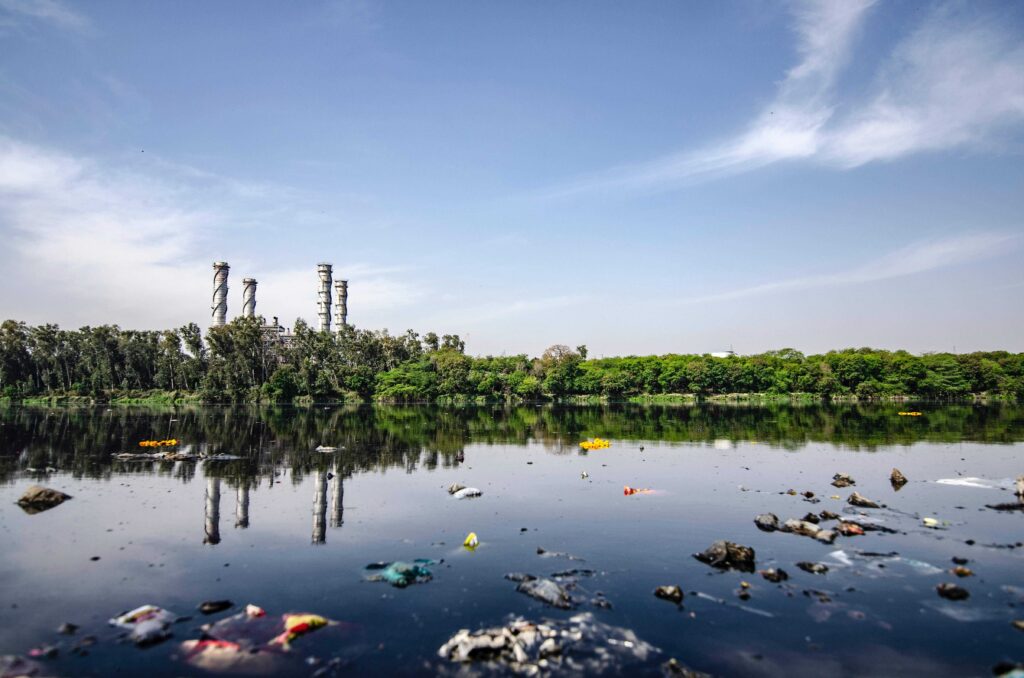
b.Citizen water treatment pollution
Many municipal water plants rely on the original conventional treatment processes of flocculation, sedimentation, air flotation, coarse filtration, and chlorination due to the relative simplicity of the equipment and processes, which can no longer meet the requirements of high-quality drinking water.

C. Secondary pollution of the water pipeline network
After leaving the waterworks, tap water needs to go through a long pipeline network and facilities such as water towers and water tanks, which are exposed to many pollutants and have serious pollution risks, such as pipe rupture, red worm breeding, rust, scaling, and corrosion.
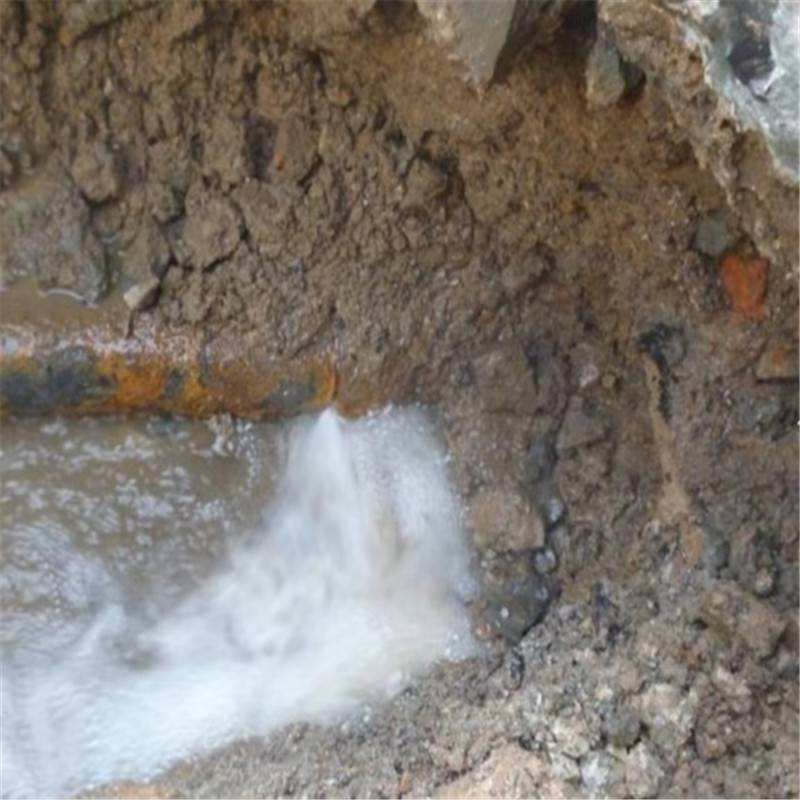
d. Industry pollution
The rapid development of mining, industry and agriculture has caused heavy metals from mines to be washed into rivers by rainwater, industrial discharges to discharge organic substances benzene, phenols and plasticizers into water bodies, and pesticide residues and colloids used in agriculture can also pollute water sources. Toxic and harmful substances in water (such as heavy metals, phenols, plasticizers, pesticide residues, colloids, impurities and bacteria, radioactive and fluorescent substances) are harmful to the body, especially affecting the health of children and women.
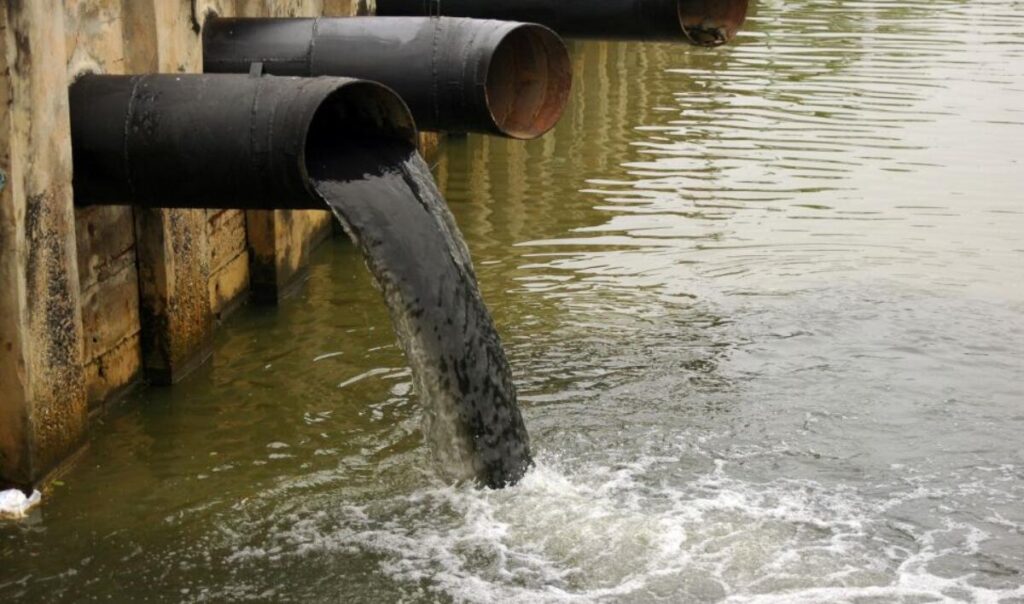
e.Water hardness is too high (high chlorine water)
Limescale is becoming increasingly serious. Scaling water not only has unpleasant tastes but also affects the work of water-related appliances. In particular, appliances such as water heaters, Wasserkocher, etc. may lead to the risk of leakage and endanger the safety of your family.
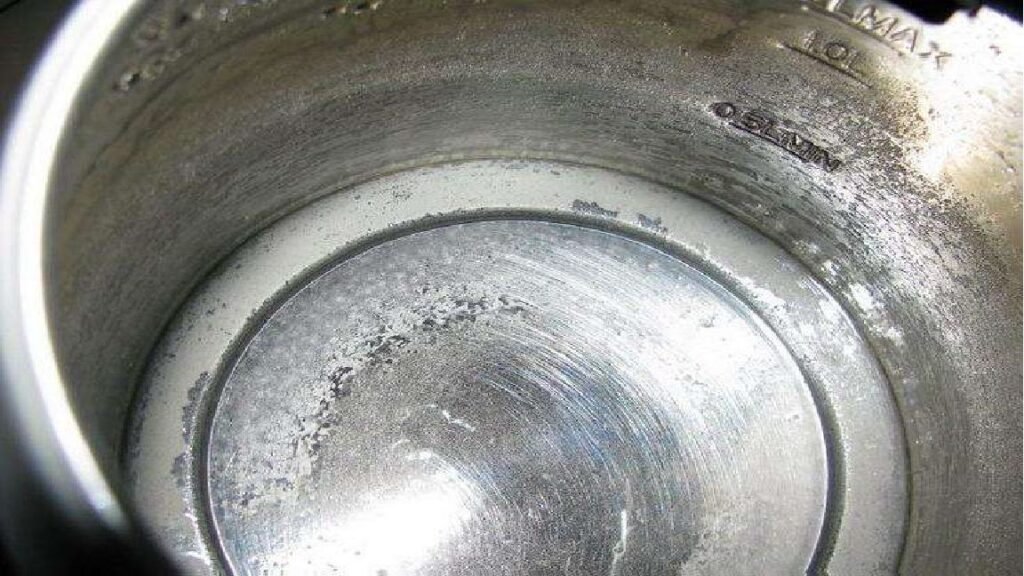
Als Ergebnis, under-kitchen water filters have become a must-have for many families.
Does a water filter really work?
No filter system can completely remove all water contaminants, and the need to know what the system does before you buy is important. But undoubtedly, purified water with a water filter is good for health benefits.
Not all filters use the same technologies, hence you must carefully study the labels.
Classification of water filter systems
There is a wide range of water filters on the market, not only with a wide variety of filter cartridges but also with different filtering effects. Here we look at what water filters are available and the differences between them.
Water purification effect
Microfiltration Filters (MF)
(MF): filtration accuracy is generally 0.1-50 Mikrometer, a variety of common PP cartridges, activated carbon cartridges, ceramic cartridges, etc. belong to the category of microfiltration to coarse filtration, filter water sediment, removing particles and other large particles of impurities, but can not remove bacteria and other harmful substances in the water. The cartridge is usually not washable and is a disposable filter material, which needs to be replaced frequently.
Ultrafiltration filters (UF)
The filtration precision is 0.001-0.1 micron, which is a kind of membrane separation technology using pressure difference, and can filter out rust, sediment, suspended matter, colloid, bacteria, macromolecular organic matter and other harmful substances in water, and can retain some mineral elements beneficial to the human body. It is the core component of the production process of mineral and mountain water. UF is also the most used water purifier on the market today.
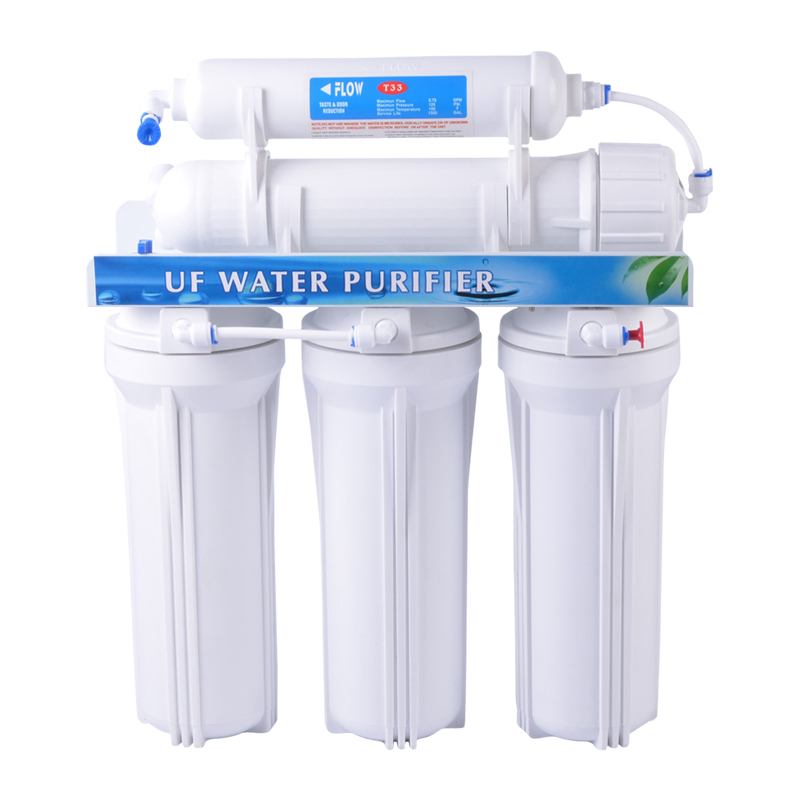
In terms of also water flow, they have an output of about 1.5 liters – 2.2L per minute.
Nanofiltration filters (NF)
The filtration accuracy is between ultrafiltration and reverses osmosis, the desalination rate is lower than reverse osmosis, it is also a membrane separation technology that requires appliances, pressurization, and the water recovery rate is lower. Generally used in industrial pure water manufacturing, general household filtration is less used NF.
Reverse osmosis (RO)
Filtration accuracy of about 0.0001 Mikrometer, it can filter out almost all impurities in water (both harmful and beneficial) and only allows water molecules to pass through, generally used in the manufacture of pure water and pharmaceutical ultra-pure water.
The actual water production capacity of RO is the amount of water produced by the RO film. The filtration speed of the RO membrane is relatively slow, and the water output of the reverse osmosis water filter is relatively small, which cannot meet the needs of users who want to take water at any time. In order to solve the user’s demand for water at any time, a water storage tank comes into play. When the user is not taking water, the reverse osmosis water filter is still working, storing the filtered pure water in the storage tank first, and when the user takes water, it is directly output from the storage tank to the outside, so that the user does not have to spend time waiting for the water to be made. So RO machines also require a relatively large amount of space under the kitchen.
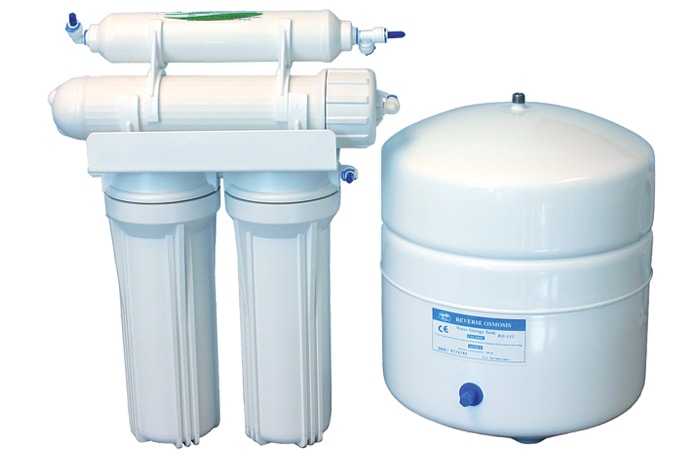
We can compare the 4 water filters in the table below.
| Particulars | Microfiltration (MF) | Ultrafiltration (UF) | Nanofiltration (NF) | Reverse Osmosis (RO) |
| Pore size | 10nm~1μm | 3~10nm | 2~5nm | Not detectable |
| Retain particulates (MW) | >300,000 | 1,000~300,000 | >150 | <350 |
| Applied pressure | 0.005~0.2 MPa | 0.01~0.3 MPa | 0.3~1.5 MPa | 1~10 MPa |
| Main applications | Removal of particles and bacteria, pretreatment for RO and UF | Drinking water production, fruit juice clarification, home water purifiers | Removal of micropollutants, desalination of brackish water, the concentration of chemicals | Desalination of brackish and seawater, Production of ultrapure water |
Based on the above data, the average household will choose either UF or RO. The following are the same key Q&As that will help you decide whether to install UF or RO water filter systems in your home.
What’s the TDS of your water? If your incoming water has a high TDS count (over 500 ppm) UF is not recommended; only RO will be effective to get the TDS down.
TIPS: Water Quality Testing: TDS (with a photo of TDS testing)
Water quality testing is an important means of water purifier comparison, TDS is one of the water quality testing indicators.TDS is also known as Total Dissolved Solids, which indicates how many milligrams of dissolved solids are dissolved in 1 liter of water. The higher the TDS value, the more dissolved substances are contained in the water. This TDS is directly related to the hardness of the water. If the TDS is high, the more dissolved solids in the water, the harder it is and the worse it tastes, and vice versa. So we test the water quality, the lower the TDS the better. Normalerweise, a TDS value of 500 or more means that the water is too hard.
1. Do you like the taste of minerals in your water for drinking? (If yes: UF suggested). Some people think RO water does not taste of anything, and others think it tastes flat and/or is slightly acidic as it is just pure water.
2. How much space do you have under your sink – is there room for a storage tank?
3. What’s your water pressure? RO needs a minimum of 50 psi to function properly – if you don’t have 50psi you’ll need a booster pump. UF works smoothly at low pressure.
4. Do you have a preference for wastewater? For each 4L/ 1 gallon of RO water, about 11.5L/3 gallons go to the drain. UF produces no wastewater.
What are the best brands of UF filters and RO machines and how do they compare at price?
HCDRINK has created the following table for a quick comparison.
| Nein. | Marke | Performance | Wastewater radio | Flux size | Water quality monitor | Price | UF or RO |
| 1 | A.O.SMITH | √ | 3:1 | 1.2L/Min (500G) | √ | $480+ | RO |
| 2 | PENTAIR丨EVERYPURE | √ | 1.5:1 | 1.05L/Min (400G) | √ | $160+ | RO |
| 3 | ECO WATER | √ | 2:1 | 1.05L/Min (400G) | × | $320+ | RO |
| 4 | PHILIPS | √ | 1.5:1 | 1.58L/Min (600G) | × | $320+ | RO |
| 5 | Honeywell | √ | 1:1 | 1.05L/Min (400G) | √ | $320+ | UF |
| 6 | WATTS | √ | 1:1 | 1.05L/Min (400G) | × | $480+ | UF |
| 7 | CULLIGAN | √ | 2.25:1 | 1.05L/Min (400G) | × | $480+ | RO |
| 8 | 3M | √ | 1:1 | 1.05L/Min (400G) | × | $80+ | UF |
| 9 | SEHAN | √ | 3:1 | 0.27L/Min (100G) | × | $160+ | RO |
| 10 | ASPIRING | √ | 1.5:1 | 1.2L/Min (500G) | × | $400+ | RO |
Size and connector (with branded 3/8 und 1/4 size sheets, combined in one piece)
The size of the water filter is an issue that has to be considered during the water filter installation process. Water filters, Wasserkocher, water chillers and food waste disposers are now popular under the kitchen and must be measured in advance to ensure that the space under the kitchen is adequate.
There are generally three standard connectors for water filters: FG 3/8, FG1/4, or FG 1/2, generally with FG3/8 or FG1/4.
How to choose a water filter for a water boiler
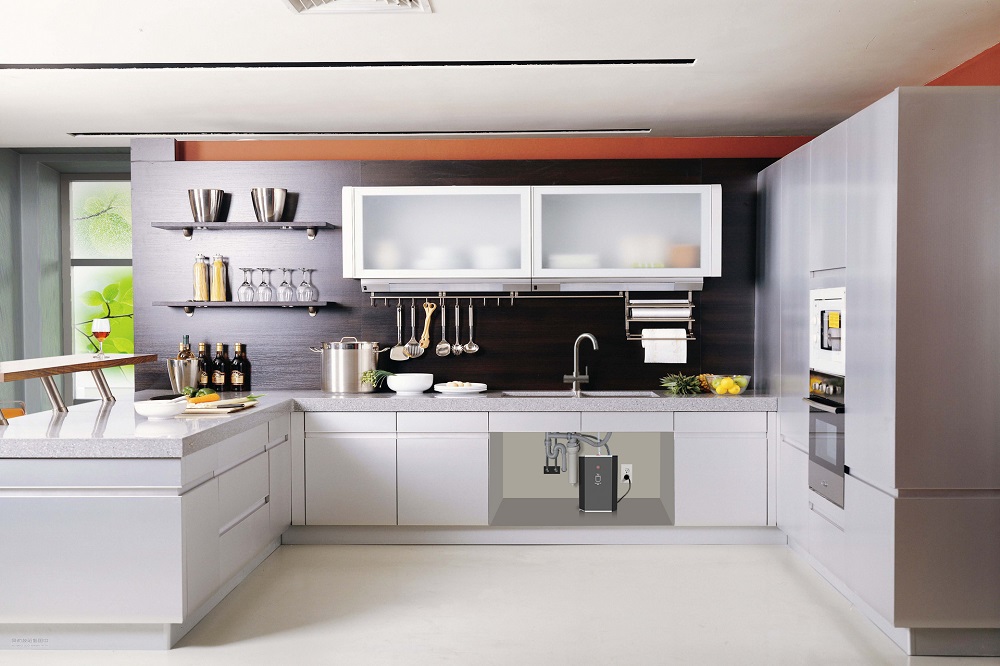
Iwater company requires the user to install the water boiler with an anti-scale water filter to protect the boiler and electric elements. And every 6 months or 2000L water used must be replaced the filter cartridge to have good taste for the water. (with pictures of limescale deposited in the stainless steel liner or heating pipe)
Two types of taps have been designed to match UF or RO water filters as a solution for most standard filters, taking into account the water quality in different countries, UF water filter works with any HCdrink faucets. RO filter won’t work with 2in1 and 3in1 HCdrink water systems.
Iwater company’s anti-scale filters use FOF anti-scale material raw material certified by NSF. In the budding stage of scale growth, i.e. the early stage of scale nucleation, the active ingredients of FOF directly participate and interfere with the scale nucleation process in the form of ions, distorting the nucleus and forcing it to die in the development stage. More information for reading the article about HCdrink FOF filters.
With the fast connector, it is quite easy to do replacement or maintenance after installation. With the under sink water system, it is free to carry heavy bottles for water dispensers, not necessary to purchase bottled water. And having hot water to cook or make coffee from tap water is quite easy and safe without scalding.
We believe that through the above introduction, we have a very intuitive understanding of the water filters. I hope that HCdrink will help you not only with the convenience of boiling water at the touch of a button but also with the most suitable for your healthy drinking water.
More information on purchases visit the company website:www.hcdrinkwater.com
or send e-mail for contact now at contact@chinaiwater.com
